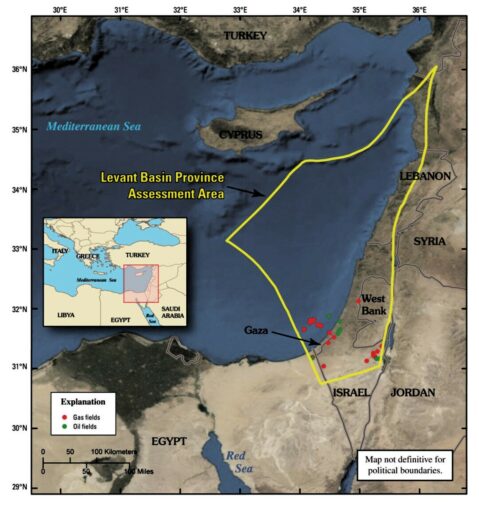Israel – Base of Western imperialism
Seattle
The U.S. has always enlisted Israel as a militarized pawn to protect its oil interests in the region. This has been the position of the Workers World Party since it held perhaps the only demonstration in the U.S. against Israel’s infamous six-day war in 1967. In that blitzkrieg, Israel, with U.S. arms and airpower, stole much of the Palestinian land that it controls today.

The Levant Basin Province, with 122 trillion cubic feet of natural gas, one of the most important natural gas resources in the world, lies off the coast of Palestine.
After World War I, Palestine was put under a British Mandate. The U.S. started investing in Gulf region petroleum at this time. U.S. oil interests in West Asia greatly increased at the end of World War II, when the U.S. surpassed Britain and France as the main imperialist power in the region and world.
The U.S. bided its time, waiting to take over “the protection of the National Home itself” according to the “War in the Mideast,” a pamphlet published by WWP in 1967. Meanwhile, U.S. capital continued to play an ever more important role in buying up Palestinian land.
In 1948, the end of the British Mandate marked the beginning of U.S. sponsorship of Israel. As the U.S. and Israeli relationship continued, it was said that “Israel’s job is to be a kind of watchdog,” according to G. Shoken, editor of the Israeli newspaper Haaretz. “Israel can be trusted to be able to punish one or a number of the neighboring countries whose lack of politeness towards the West became too much.”
Indeed, Israel has waged wars, assassinations, and covert operations throughout the Arab World and beyond on behalf of its imperialist sponsors.
The material interests behind this aggression are the oil profits stolen from the Palestinians and other peoples of the region. Economist Victor Perlo wrote in 1967, “For every dollar’s worth of oil products derived from Middle Eastern oil … the governments get about 10 cents and the Arab workers get less than one cent.” As a result, U.S. capital outflow to the Gulf region from 1951-60 amounted to “only $216 million while income totaled about $5 billion.”
Israel’s role as a dagger against the Arab revolution helped to gain these imperialist profits.
U.S. oil profited greatly from the war on Iraq. After this genocidal war, oil giants Chevron, Exxon-Mobil and Marathon Oil signed long-term export deals for Iraqi oil, and they were soon exporting two million barrels per day of oil from Iraq. Some $8.2 million dollars worth of oil per day was shipped through the Red Sea in 2023, benefitting mostly Western imperialist oil interests. This was despite the worldwide demand to stop burning fossil fuels and to decarbonize.
Top representatives of the U.S. ruling class, especially the Rockefeller family, have greatly profited from U.S. oil in the Middle East. Without the oil profits from the Arab World and the Gulf region, the U.S. would not be in the commanding imperialist position that it is today. And the U.S. couldn’t achieve the great wealth it has without the support of its ally, Israel, in destabilizing and making war on the Palestinians and the Arab Revolution.
At stake in the future control over Gaza are vast offshore natural gas reserves along the Gaza coast, which belong to Palestine. In “Behind Israel’s ‘end game’ for Gaza: Theft of offshore gas reserves,” which appeared in Workers World newspaper on Nov. 14, 2023, Betsey Piette wrote: “Israel’s genocidal war on Palestinians has not stopped the Israeli regime’s plans for further oil and gas exploration.”
The article continues: “On Oct. 29, Israel announced that it awarded 12 licenses for exploring additional offshore natural gas fields to six companies, including British Petroleum and Italian energy giant Eni. These awards show that Israel has no intention of letting the genocide it is carrying out against Gaza’s people interfere with its ongoing theft of Palestinian resources.” (https://www.workers.org/2023/11/74864/)
But U.S.-backed Israel’s preeminent role in controlling resources in the region is being challenged by revolutionary Palestinian resistance movements and their allies like never before. The future belongs to Indigenous peoples and their right to control their lands and resources.

